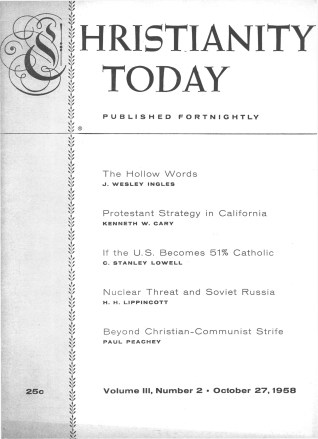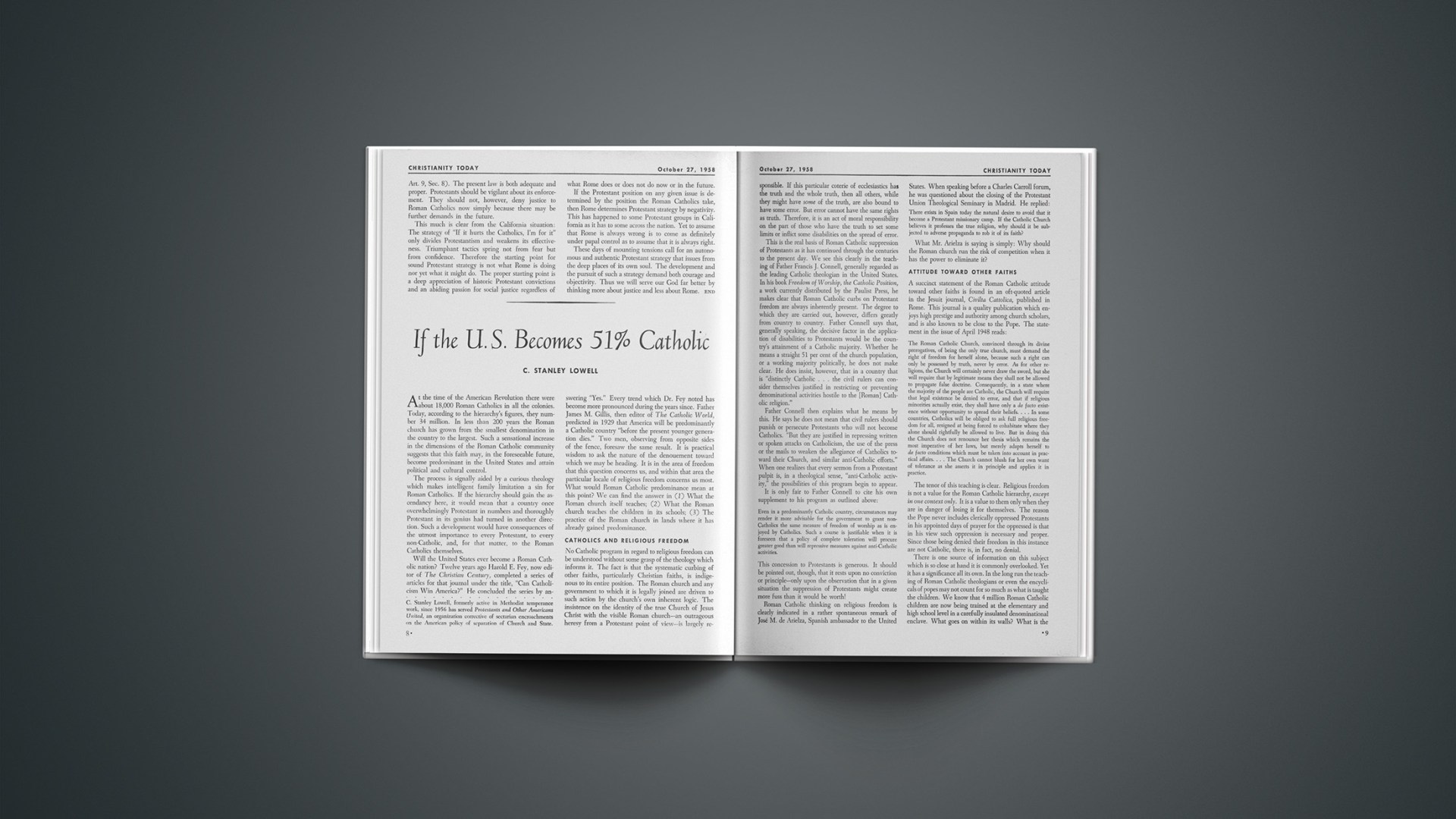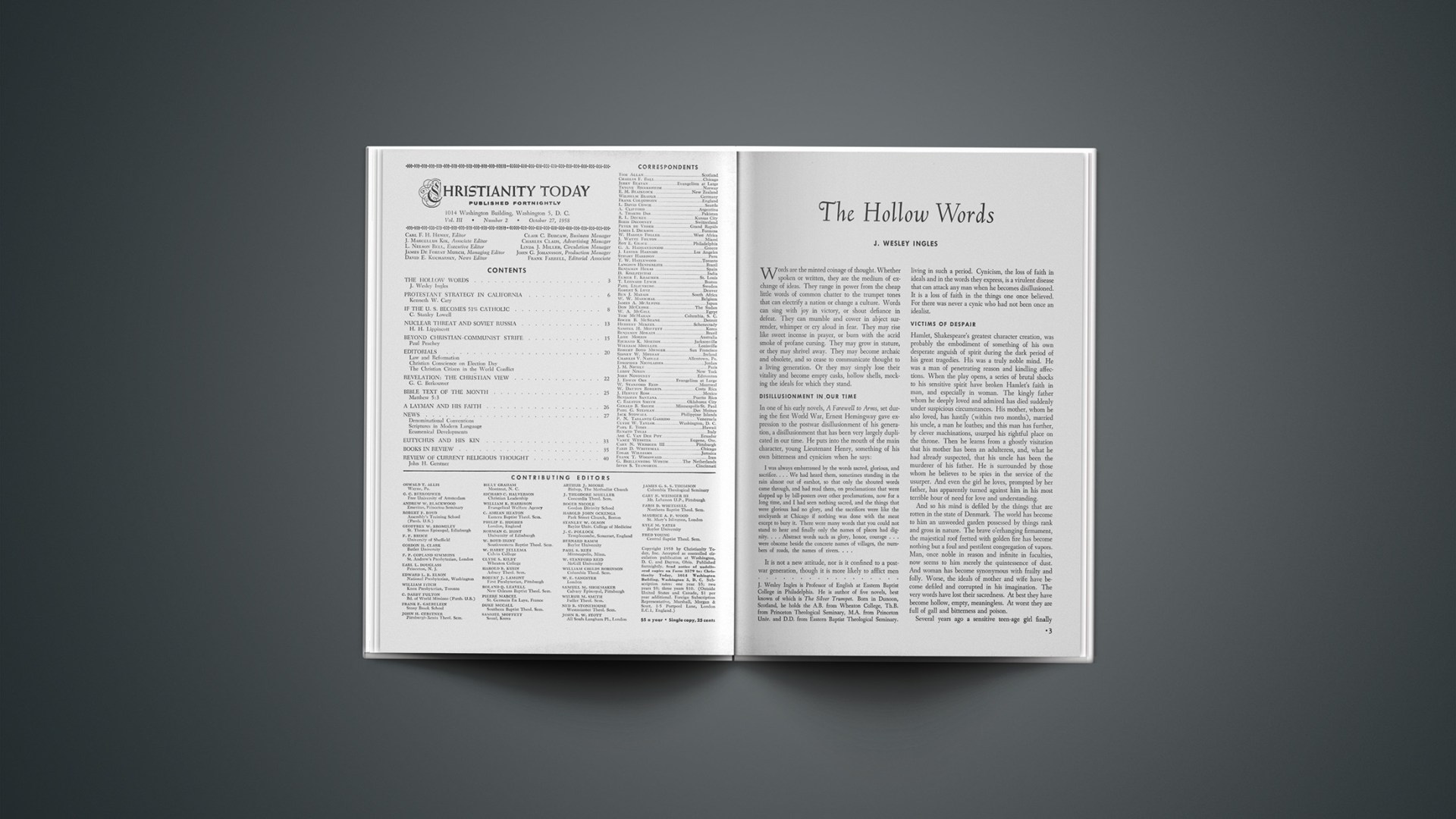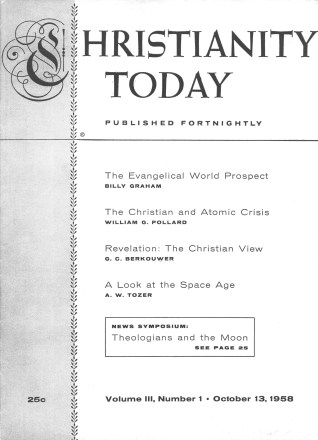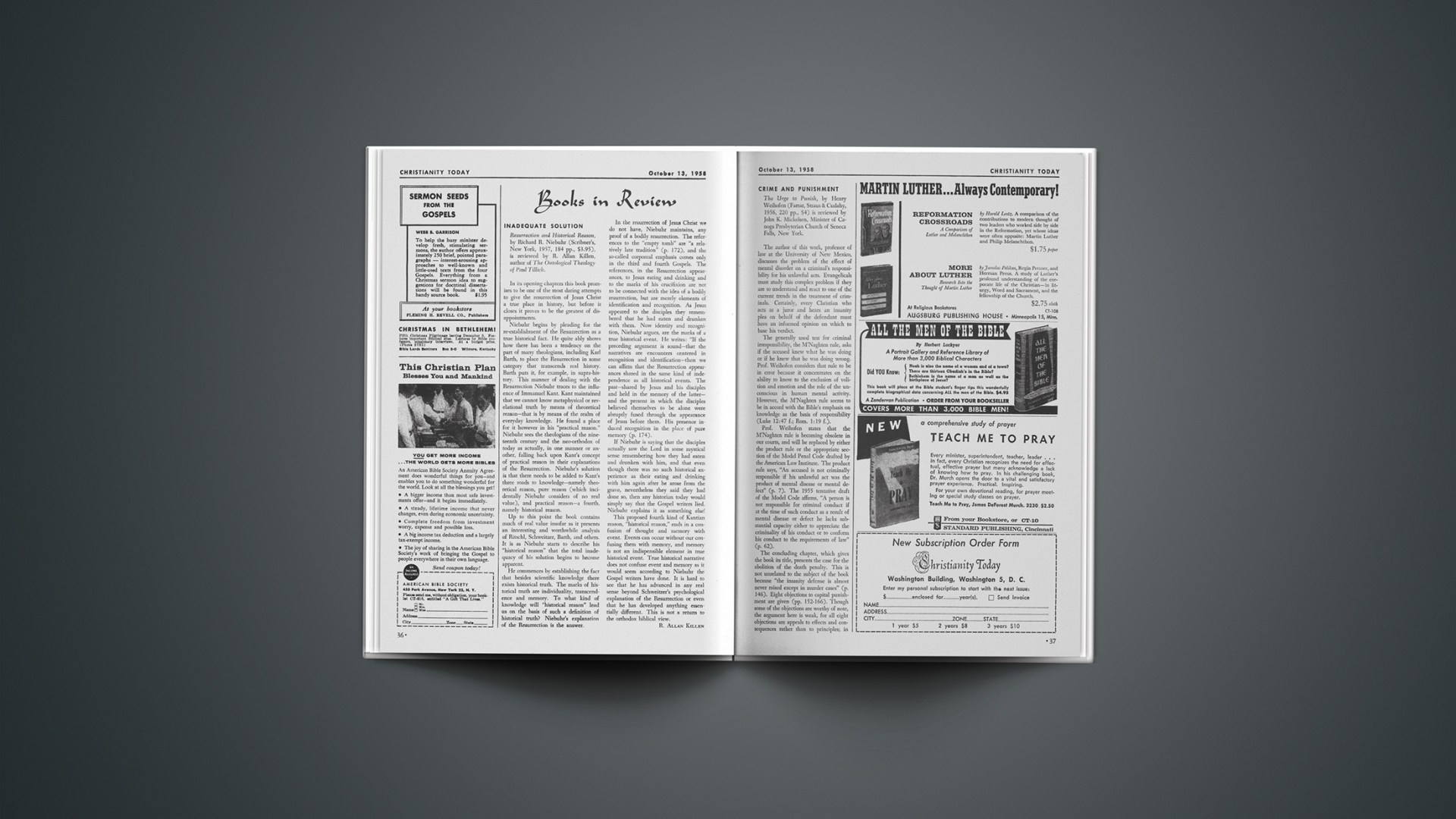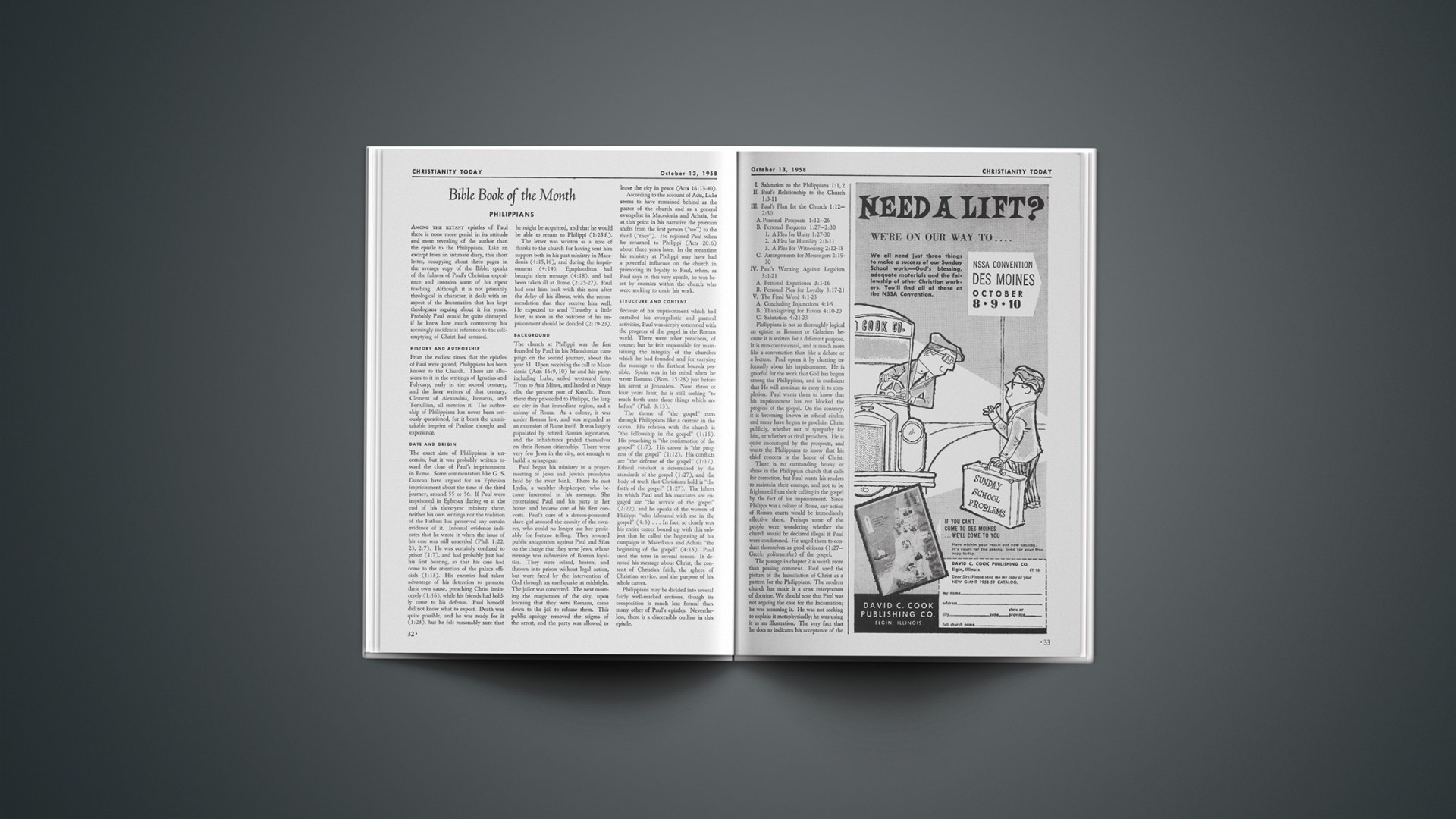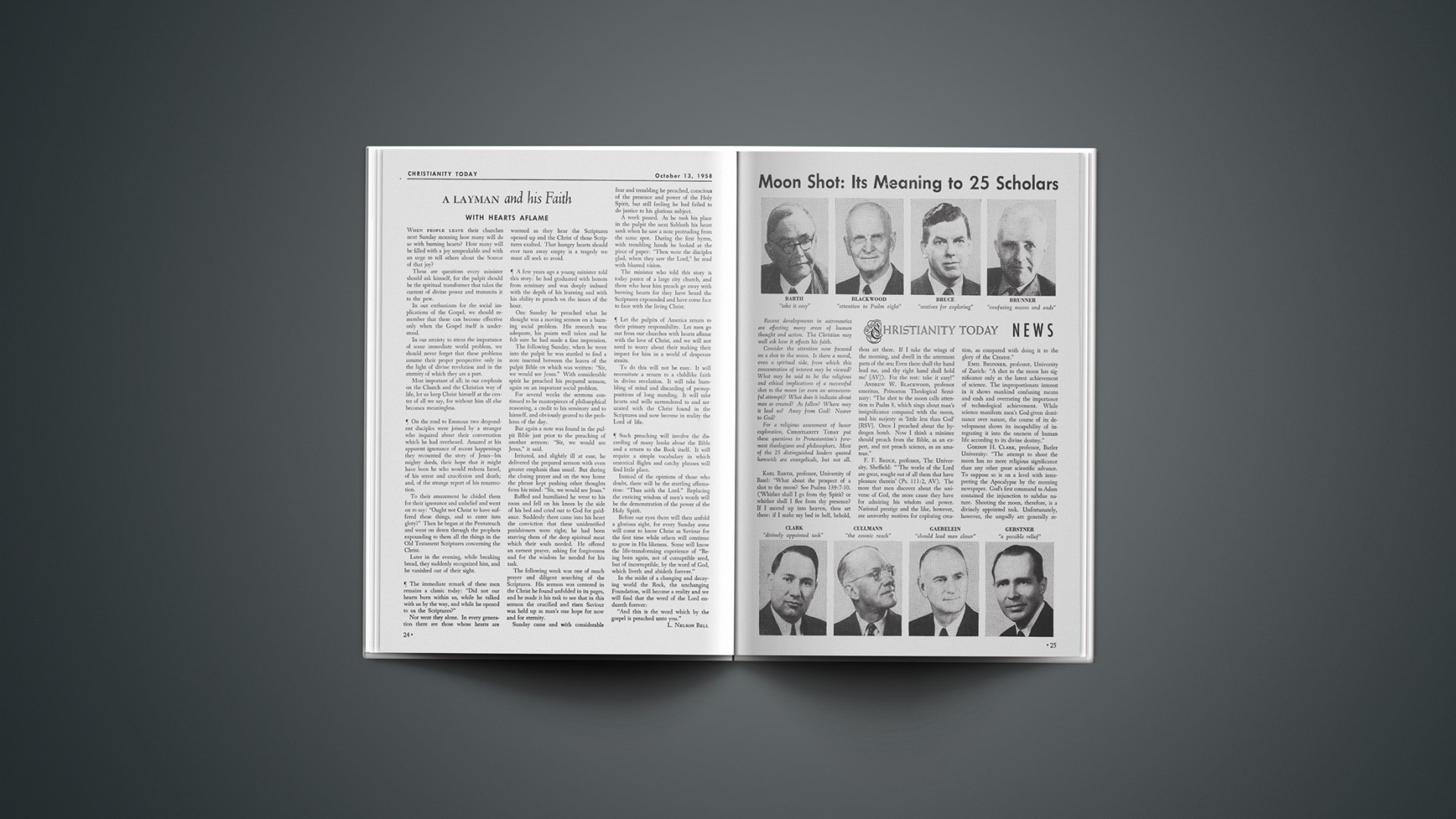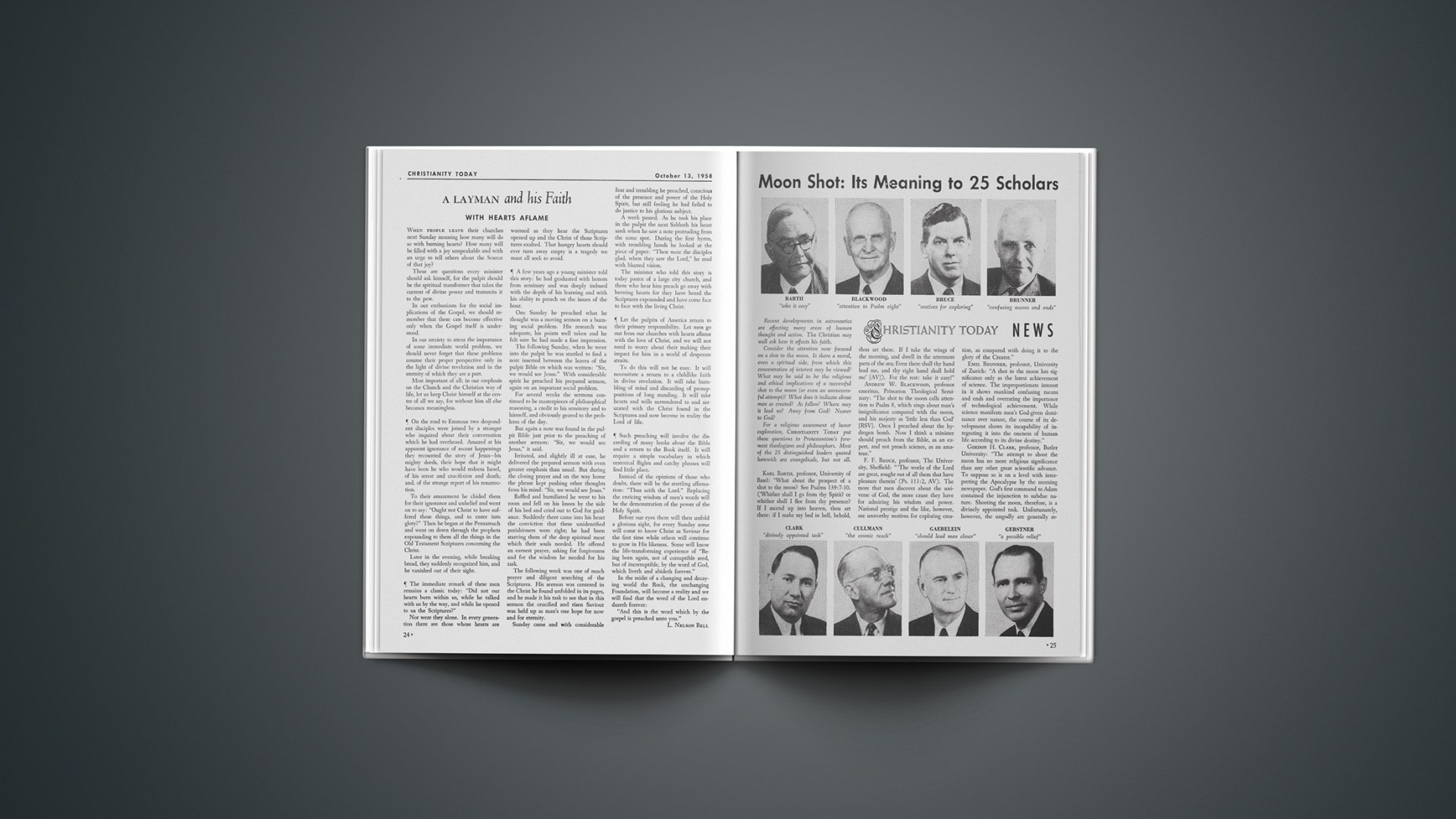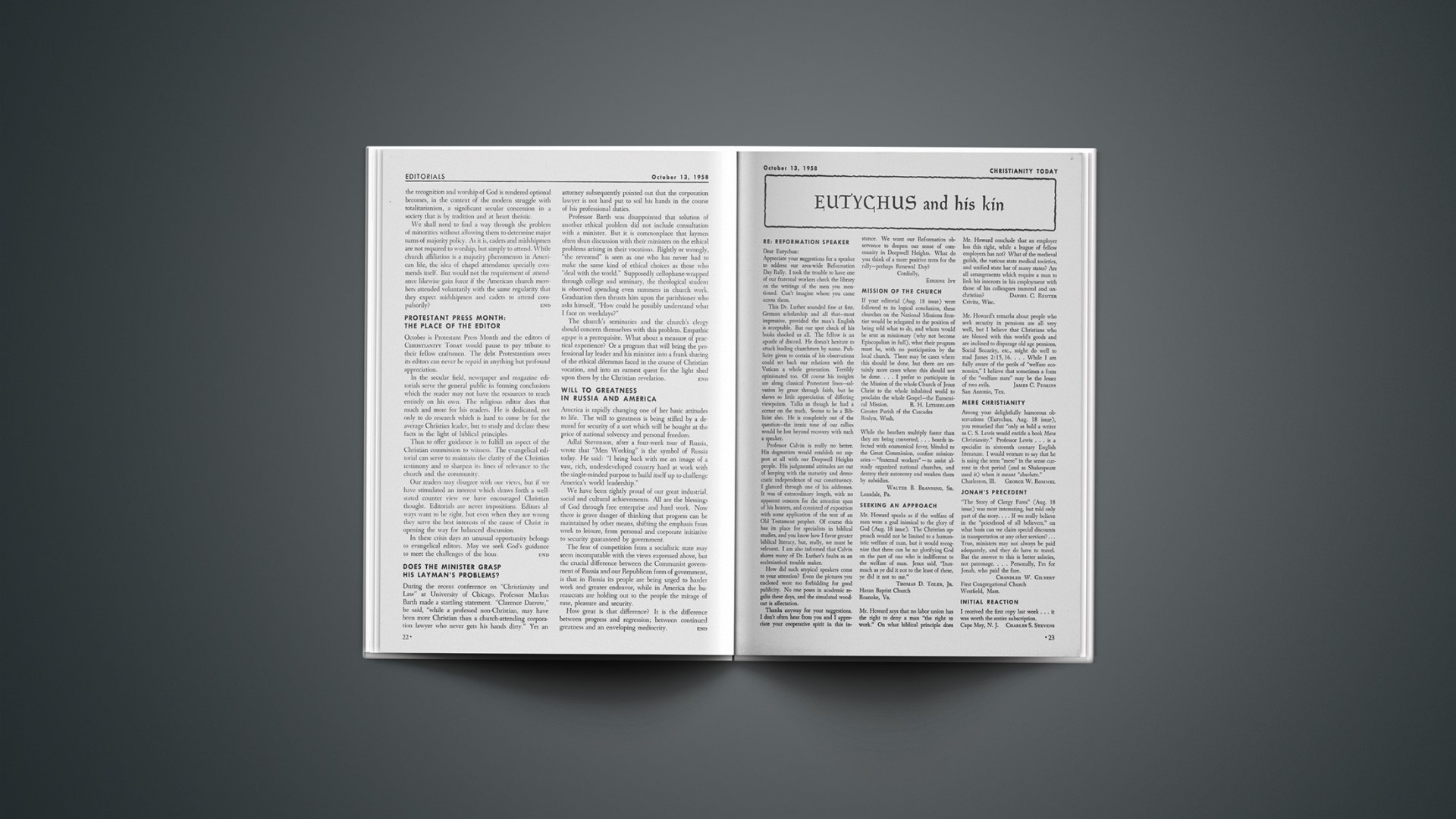In the choice between two terrible evils, Western civilization may voluntarily submit to the Soviet tyranny—a tyranny of political wickedness and monstrous power run by purges and by secret police.
The frightening force backing our world into this predicament is, of course, the implications in the lethal might of “the nuclear threat.” People the globe over are afraid, and there is cause to be. The mind staggers as problems keep spinning out of the runaway potentialities of our atomic age. The survival of humanity is at stake. Those who know most are most fearful. Token samples of the awful possibilities numb the powers of thought. The harbingers of the future are ominous. “ ‘The ashes of death’ already poison many waters and beaches of the world.”
It is a time for greatness, but civilized leaders, baffled and clumsy, stand in human littleness on a precipice, gambling with catastrophe. They are not sure which way to go, nor are they sure what they should do.
It looks as if man is not equal to the demands of history. We are developing a structural complexity we may lack the powers to sustain. One of the last signs of a crumbling epoch is a general decline in moral appreciation and in moral values. As the atom bomb sounds alarms all over life, Nobel prize winners declare that “… we are no longer great enough for ‘problems of the spirit.’ ” Nothing is left but “a massive and universal physical fear.” We can only “temporarily arrest society’s lethal self-laceration.” Influences that should be spiritual are “a mixture of will-worship, egocentricity, nihilism, jargon, verbal mystification, ontological claptrap and pornography”—pagan wails in a pagan world. What a stage for people fumbling with nuclear explosives!
The issue right now terrifies every element of decency, but—and this is the monstrous thing—it is the chance of all time for evil exploitations.
Sinister influences always exploit the fears of a frightened world. The wicked forces of the hour are, of course, making the most of our terrifying crisis. With diabolical effectiveness, clever manipulations touch and temper the interests of our age. Sensitive and nervous minds, duped with fear or caught with propaganda, are persuaded to chance some deal with evil. Moral expediency is a terrible disease which rots the soul and pauperizes finer moral sensitivities. Morality shrivels when good people think that bargains with degradation can insure decency or keep alive nobility and values.
The atomic problem today faces mankind with grim tasks. It calls for grim greatness. Unstable temperaments that progressively shake apart in the storms of history are to be feared, not trusted. Men who have been terribly wrong in the past and who have been doctrinaire in their wrongness are suspect. Yet such people always bubble into headlines in crisis hours.
Pre-Pearl-Harbor pacifism, tremendous and single-tracked in its sincerity, might have turned the world over to a philosophy of barbarism and a gospel of tyranny. In the last months of 1939, some 400 American intellectuals signed their names to endorse an uncritical crusade that “stressed the role of the Soviet Union as ‘a bulwark against War and aggression.’ ” The Soviet-German pact ironically followed almost immediately. In dangerous times, sentimental prophets are monstrous risks.
There is a point beyond which authentic moral responsibility cannot go without losing everything. It is unrealistic and self-deceiving to assume one’s commitments can be divorced from their responsible consequences. If belief in what is taken to be an ideal aids and abets international gangsters, responsibility cannot be escaped.
Illusions For Reality
Ponder today’s crusade to stop Western society from all further development of nuclear weapons. In some queer way, it is thought that this alone affords humanity its only chance of survival. The implications and responsibilities are enormous.
We may again be seeing how fearful people in tough times substitute illusions for reality. The movement offers no substantiating facts, no scientific principles, no realistic credentials and no proofs. Because nothing is predictable or real about it, the easiest thing in the world is to claim anything and everything for it. One must meditate long upon the thing if he is to comprehend the immense implications.
If the West stops all further nuclear development, the Soviet Union automatically achieves a nuclear monopoly over the world. That by any standard is a monstrous and awful risk! When before did moral man ever think he could find hope by directly or indirectly implementing barbarism with the might of matchless power? When before did intelligent people admit a willingness to chance the future of the race on the inhumanity of an acknowledged despotism?
The strange and dreadful recommendation of this movement which calls itself “A Sane Nuclear Policy” makes realistic newspapers ask about man’s sanity. Isn’t there something twisted when men of eminent position sponsor a crusade which will give brutal communism unquestionable control of the planet? A token of the amazing distortion lies in the conflict between the emotionally excited important people and the park bench realism of the common man. What idealism will, for any reason, voluntarily accept chances with Soviet domination? In the words of the New York Daily News, “We do not charge these persons with consciously trying to do a job for the Kremlin.” But we shudder at topflight emotionalism aligned, to all practical purposes, on the side of Moscow’s immorality. Time magazine quotes the view “of Bertrand Russell, and Philip Toynbee—son of the famed historian—that nuclear disarmament will probably bring Communist domination but that domination is preferable to the prospect of nuclear war” (February 21, 1958). Another version from a different, but top source, comes yet more vividly to the point: “… to be dominated seems to me to be a lesser evil than to get oneself extinguished” (May, 1958).
The Flight From Martyrdom
The drift is to an all-time low for moral expediency. This belief, bluntly stated, says that the only summum bonum of existence is to make sure of staying physically alive. If this mind-pattern of expediency appeals to leadership, may not that have something to do with the tendencies that have decimated so much of the moral life of our era? When before did men of conviction stand in abject fear and confess they would do anything to stay alive? With that standard decency disappears, liberty dies and animal interests are accepted morality. What about the nobility and values of moral convictions? What about the deep cry of the heart for righteousness and for truth and for justice? Were the martyrs of the past inexpedient fools? They could have stayed alive. Are we at long last to give up the moral law, that moral law which has held over nobler ages the unbounded sway of something greater than the selfish desire of men, to save their skins? What values can a humanity possess if it will not die to protect its convictions? Authentic civilization still lives in the principle, “Give me liberty or give me death!” Isn’t there something seriously wrong when men of good will actually believe that serfdom is today a lesser evil than martyrdom for a cause?
The choice now is one of the most serious in history. There has never been anything like it before. The dilemma is: an expedient trust in cynical faithlessness or paying, price down, the cost of austere integrity. The blood of freemen runs cold at the thought of liberty-loving people in high position expressing a deliberate willingness to accept “a Communist dominated world.” For posterity nothing could be more cruel.
World Government by the Soviet Union! The power-drunk infamy of Moscow Lord of the world! World government by degradation because the principles of civilized existence are giving themselves up—because men no longer prefer death and extinction to injustice or to inhumanity and slavery! The twisted moral situation is amazing, namely:
“Uncompromising loyalty to moral principles may mean extinction of the race.” That is a monstrous thought!
“Submission to evil domination may be humanity’s only chance of survival.” That is an even yet more monstrous thought!
Is there any morality in a willingness to turn the world over to the butchers of Hungary because the alternative may mean crucifixion? Can authentic morality gamble on the ruthless degradation of a Communist dominated world? Such promethean defiance of moral principles misses the bottom law of elementary virtue, for absolute power corrupts absolutely and absolute corruption can only decimate the world. Making self-preservation the sole concern of existence is the sure-fire way for a civilization to get itself extinguished. “The paramount aim of the Roman Empire was to keep itself alive.” The self-centered rule disintegrated into chaos and annihilation. In a moral world, a philosophy essentially interested in saving our hides can do nothing but ruin us. Moral laws govern the rise or fall of men and nations, lifting or destroying them with silent and inexorable fatality (Burke). The nemesis of violated axioms is destruction.
What about the willingness to accept, for any reason, an all-powerful Moscow master or—what is more amazing still—the willingness to accept, for any reason, a totally helpless democratic world? A strange recipe indeed for the survival of mankind! What can come out of betraying civilization?
We are witnessing, perhaps, another copybook lesson from history. Recall the silly days in the 1930’s when leaderships of great nations were so afraid of war that they shouted “peace for our time” and submitted to anything. Out of those came the second World War. Hitler tore up the earth because people believed there was nobility and safety in pious platitudes. Vociferous public characters emotionalized themselves into believing that they alone were “realistic, hardheaded and practical.” The motive was the overpowering fear of war. The motive now is the overpowering fear of nuclear explosives. Again logic is underlining, for those who will see it, the evil of ignoring principles. The romanticism that was to stop war in the 1930’s brought war. The sentimentalism of today which thinks it can insure humanity’s survival by debasing the morality of existence can do nothing but disintegrate the race.
The essence of civilization is the will to oppose evil and to stop, at all costs, the enemies of liberty and of decency and of spiritual values. Anything else degrades the moral status of the world. Only a paragon of moral stupidity can dream of taking chances with sinfulness to achieve that which is good. When willful depravity is at work in the world we must not bargain with it for advantages. It is wrong to speak of gambling with expediencies as “a great act of faith.” It is moral betrayal. How far can we go in “striving to concede to international desperadoes a moral capacity?”
If the West stops in the nuclear race, the Soviet Union automatically is in nuclear command of the globe. In that situation, the United States would be turned into a Russian satellite with dizzy speed. Remember what happened to the countries that put their trust in helplessness or thought they could do business with communism.
The last “scribbled message of Imre Nagy”—now a martyr—cracks like the rifle-fire of Lexington around the globe saying: “I want the world to know there can be no compromise!” The soldiers at Corregidor were trapped like rats but they died like men. When you appeal to history, that great teacher of mankind, you find an invocation “not to caution, but to courage” (Clemenceau). If we are coming to the end of the way and if the final curtains are set to fall on the disappearance of all consciousness, it is, I think, nobler to “go out” like moral men than to make the last act of existence the story of voluntary slaves who were willing to do anything to stay alive.
A World Government run by the Soviet Union is a terrifying thought! What is more amazing is the fact that there are freemen ready to accept it.
END
Commander H. H. Lippincott, United States Navy, Retired, served as Chaplain with the United States Fleet in the First World War. He holds the A.B., A.M., and S.T.B. degrees from Dickinson College and Boston University, and has served pastorates in New Jersey, Pennsylvania and Massachusetts. He now resides at 26 Colonial Road, Morristown, New Jersey.


